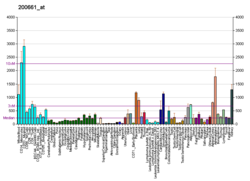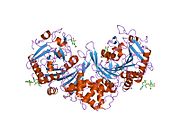Cathepsin A
Cathepsin A is an enzyme that is classified both as a cathepsin and a carboxypeptidase. In humans, it is encoded by the CTSA gene.[5] The enzyme is also known as Human Protective Protein. It is a lysosomal serine carboxypeptidase. The enzyme is a zymogen and must be processed to produce a 32 kDa and 20 kDa large and small subunit, respectively, to become catalytically active. Cathespin L can activate Cathepsin A in vitro.[6][7]
Structure
[edit]Cathepsin A contains a large and small subunit. The active site contains unusual pairs of carboxylic acids hydrogen bonded to one another, sometimes referred to as "Rebek pairs".[8]

The pairing of these carboxylic acids raises the pKa of one glutamate to ~13 while the other has a predicted pKa of ~6.[9]
Function
[edit]This gene encodes a glycoprotein that associates with lysosomal enzymes beta-galactosidase and neuraminidase to form a complex of high-molecular-weight multimers. The formation of this complex provides a protective role for stability and activity. It is protective for β-galactosidase and neuraminidase.[10]
Substrates
[edit]CTSA is part of the Renin Angiotensin System (RAS). Substrates of the enzyme that have been identified in vitro include endothelin I, angiotensin I, bradykinin, Substance P, and oxytocin.

Inhibition
[edit]Cathepsin A is one of 14 human enzymes commonly inhibited by organophosphate pesticides and phosphonate nerve agents. Cathepsin A can be inhibited by sarin, soman, cyclosarin, VX, and VR.[11] After inhibition, it undergoes aging. The enzyme can be found in urine and blood.
Clinical significance
[edit]Deficiencies in this gene are linked to multiple forms of galactosialidosis.[5]
Interactions
[edit]Cathepsin A has been shown to interact with NEU1.[12]
References
[edit]- ^ a b c GRCh38: Ensembl release 89: ENSG00000064601 – Ensembl, May 2017
- ^ a b c GRCm38: Ensembl release 89: ENSMUSG00000017760 – Ensembl, May 2017
- ^ "Human PubMed Reference:". National Center for Biotechnology Information, U.S. National Library of Medicine.
- ^ "Mouse PubMed Reference:". National Center for Biotechnology Information, U.S. National Library of Medicine.
- ^ a b "Entrez Gene: CTSA cathepsin A".
- ^ Kolli N, Garman SC (April 2014). "Proteolytic activation of human cathepsin A". The Journal of Biological Chemistry. 289 (17): 11592–11600. doi:10.1074/jbc.M113.524280. PMC 4002070. PMID 24599961.
- ^ "Recombinant Human Cathepsin A/Lysosom Carboxypeptidase A". R&D Systems. Catalog #: 1049-SE.
- ^ Rebek J, Duff RJ, Gordon WE, Parris K (September 1986). "Convergent functional groups provide a measure of stereoelectronic effects at carboxyl oxygen". Journal of the American Chemical Society. 108 (19): 6068–6069. doi:10.1021/ja00279a081. PMID 22175389.
- ^ Khavrutskii IV, Compton JR, Jurkouich KM, Legler PM (December 2019). "Paired Carboxylic Acids in Enzymes and Their Role in Selective Substrate Binding, Catalysis, and Unusually Shifted pKa Values". Biochemistry. 58 (52): 5351–5365. doi:10.1021/acs.biochem.9b00429. PMID 31192586.
- ^ Mitchell, Richard Sheppard, Kumar, Vinay, Robbins, Stanley L., Abbas, Abul K., Fausto, Nelson (2007). "Table 7-6". Robbins basic pathology (8th ed.). Saunders/Elsevier. ISBN 978-1-4160-2973-1.
- ^ Bouknight KD, Jurkouich KM, Compton JR, Khavrutskii IV, Guelta MA, Harvey SP, et al. (July 2020). "Structural and kinetic evidence of aging after organophosphate inhibition of human Cathepsin A". Biochemical Pharmacology. 177: 113980. doi:10.1016/j.bcp.2020.113980. PMID 32305437.
- ^ van der Spoel A, Bonten E, d'Azzo A (March 1998). "Transport of human lysosomal neuraminidase to mature lysosomes requires protective protein/cathepsin A". The EMBO Journal. 17 (6): 1588–1597. doi:10.1093/emboj/17.6.1588. PMC 1170506. PMID 9501080.
Further reading
[edit]- Morreau H, Galjart NJ, Willemsen R, Gillemans N, Zhou XY, d'Azzo A (September 1992). "Human lysosomal protective protein. Glycosylation, intracellular transport, and association with beta-galactosidase in the endoplasmic reticulum". The Journal of Biological Chemistry. 267 (25): 17949–17956. doi:10.1016/S0021-9258(19)37135-2. PMID 1387645.
- Halal F, Chitayat D, Parikh H, Rosenblatt B, Tranchemontagne J, Vekemans M, et al. (June 1992). "Ring chromosome 20 and possible assignment of the structural gene encoding human carboxypeptidase-L to the distal segment of the long arm of chromosome 20". American Journal of Medical Genetics. 43 (3): 576–579. doi:10.1002/ajmg.1320430314. PMID 1605251.
- Jackman HL, Tan FL, Tamei H, Beurling-Harbury C, Li XY, Skidgel RA, et al. (July 1990). "A peptidase in human platelets that deamidates tachykinins. Probable identity with the lysosomal "protective protein"". The Journal of Biological Chemistry. 265 (19): 11265–11272. doi:10.1016/S0021-9258(19)38586-2. PMID 1694176.
- Zhou XY, Galjart NJ, Willemsen R, Gillemans N, Galjaard H, d'Azzo A (December 1991). "A mutation in a mild form of galactosialidosis impairs dimerization of the protective protein and renders it unstable". The EMBO Journal. 10 (13): 4041–4048. doi:10.1002/j.1460-2075.1991.tb04980.x. PMC 453152. PMID 1756715.
- Galjart NJ, Morreau H, Willemsen R, Gillemans N, Bonten EJ, d'Azzo A (August 1991). "Human lysosomal protective protein has cathepsin A-like activity distinct from its protective function". The Journal of Biological Chemistry. 266 (22): 14754–14762. doi:10.1016/S0021-9258(18)98751-X. PMID 1907282.
- Yoshida K, Oshima A, Shimmoto M, Fukuhara Y, Sakuraba H, Yanagisawa N, et al. (August 1991). "Human beta-galactosidase gene mutations in GM1-gangliosidosis: a common mutation among Japanese adult/chronic cases". American Journal of Human Genetics. 49 (2): 435–442. PMC 1683306. PMID 1907800.
- Wiegant J, Galjart NJ, Raap AK, d'Azzo A (June 1991). "The gene encoding human protective protein (PPGB) is on chromosome 20". Genomics. 10 (2): 345–349. doi:10.1016/0888-7543(91)90318-9. PMID 2071143.
- Strisciuglio P, Sly WS, Dodson WE, McAlister WH, Martin TC (December 1990). "Combined deficiency of beta-galactosidase and neuraminidase: natural history of the disease in the first 18 years of an American patient with late infantile onset form". American Journal of Medical Genetics. 37 (4): 573–577. doi:10.1002/ajmg.1320370431. PMID 2148053.
- Kase R, Itoh K, Takiyama N, Oshima A, Sakuraba H, Suzuki Y (November 1990). "Galactosialidosis: simultaneous deficiency of esterase, carboxy-terminal deamidase and acid carboxypeptidase activities". Biochemical and Biophysical Research Communications. 172 (3): 1175–1179. doi:10.1016/0006-291X(90)91572-A. PMID 2244901.
- Willemsen R, Hoogeveen AT, Sips HJ, van Dongen JM, Galjaard H (March 1986). "Immunoelectron microscopical localization of lysosomal beta-galactosidase and its precursor forms in normal and mutant human fibroblasts". European Journal of Cell Biology. 40 (1): 9–15. PMID 3084261.
- Verheijen FW, Palmeri S, Galjaard H (January 1987). "Purification and partial characterization of lysosomal neuraminidase from human placenta". European Journal of Biochemistry. 162 (1): 63–67. doi:10.1111/j.1432-1033.1987.tb10542.x. PMID 3102233.
- Nanba E, Tsuji A, Omura K, Suzuki Y (April 1987). "Galactosialidosis: a direct evidence that a 46-kilodalton protein restores deficient enzyme activities in fibroblasts". Biochemical and Biophysical Research Communications. 144 (1): 138–142. doi:10.1016/S0006-291X(87)80486-2. PMID 3107551.
- Galjart NJ, Gillemans N, Harris A, van der Horst GT, Verheijen FW, Galjaard H, et al. (September 1988). "Expression of cDNA encoding the human "protective protein" associated with lysosomal beta-galactosidase and neuraminidase: homology to yeast proteases". Cell. 54 (6): 755–764. doi:10.1016/S0092-8674(88)90999-3. PMID 3136930. S2CID 21504892.
- Chitayat D, Applegarth DA, Lewis J, Dimmick JE, McCormick AQ, Hall JG (December 1988). "Juvenile galactosialidosis in a white male: a new variant". American Journal of Medical Genetics. 31 (4): 887–901. doi:10.1002/ajmg.1320310423. PMID 3149149.
- Verheijen FW, Palmeri S, Hoogeveen AT, Galjaard H (June 1985). "Human placental neuraminidase. Activation, stabilization and association with beta-galactosidase and its protective protein". European Journal of Biochemistry. 149 (2): 315–321. doi:10.1111/j.1432-1033.1985.tb08928.x. PMID 3922758.
- van der Horst GT, Kleijer WJ, Hoogeveen AT, Huijmans JG, Blom W, van Diggelen OP (October 1983). "Morquio B syndrome: a primary defect in beta-galactosidase". American Journal of Medical Genetics. 16 (2): 261–275. doi:10.1002/ajmg.1320160215. PMID 6418007.
- Maire I, Nivelon-Chevallier AR (1982). "Combined deficiency of beta-galactosidase and neuraminidase: three affected siblings in a French family". Journal of Inherited Metabolic Disease. 4 (4): 221–223. doi:10.1007/BF02263656. PMID 6796775. S2CID 38676707.
- Pshezhetsky AV, Potier M (August 1994). "Direct affinity purification and supramolecular organization of human lysosomal cathepsin A". Archives of Biochemistry and Biophysics. 313 (1): 64–70. doi:10.1006/abbi.1994.1359. PMID 8053688.
- Ishii N, Oshima A, Sakuraba H, Fukuyama Y, Suzuki Y (June 1994). "Normal serum beta-galactosidase in juvenile GM1 gangliosidosis". Pediatric Neurology. 10 (4): 317–319. doi:10.1016/0887-8994(94)90129-5. PMID 8068159.
- Chakraborty S, Rafi MA, Wenger DA (June 1994). "Mutations in the lysosomal beta-galactosidase gene that cause the adult form of GM1 gangliosidosis". American Journal of Human Genetics. 54 (6): 1004–1013. PMC 1918177. PMID 8198123.
External links
[edit]- Cathepsin+A at the U.S. National Library of Medicine Medical Subject Headings (MeSH)







